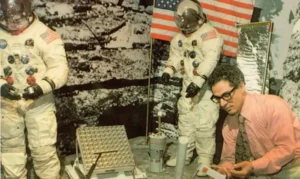
In honor of Arab American Heritage Month, we continue to recognize the economic, cultural, political, and social contributions of notable immigrants and refugees who’ve helped shape America’s vibrant tapestry. Today, we highlight Farouk El-Baz, an Egyptian American scientist whose work was instrumental in planning NASA’s Apollo Program. He was part of the team responsible for selecting the lunar sites for all six human landings on the Moon.
Born in January 1938 in Zagazig, Egypt, El-Baz grew up in a family from the Nile Delta village of Touqh el Aklaam. The Nile fueled his fascination with science and nature. He earned his bachelor of science from Ain Shams University in Cairo in 1958, followed by a master’s degree and Ph.D. in geology from the Missouri University of Science and Technology in 1961 and 1964, respectively.
As El-Baz was a leading expert in the study of deserts and how to find and sustain water in such environments, NASA called to participate in the Apollo Program as the leading geologist. His responsibilities included studying the Moon’s geology, selecting landing sites, and training astronauts in lunar observations crucial for their missions. He played a key role in the Apollo 11 mission in 1969 and the Apollo 15 rover mission in 1971.
Joining NASA in 1969, El-Baz faced challenges as a non-U.S. scientist, particularly during a time of heightened geopolitical tensions following the 1967 Arab–Israeli War. At the time, he was still a year away from being eligible for U.S. citizenship, which he obtained in 1970.
“First, I was a ‘foreigner’ because I could not apply for citizenship until after three years of residence in the U.S.,” El-Baz explains. “Second, I was a mining geologist with no background in astronomy. Third, I was an Arab and an Egyptian at a time when the Soviets were all over Egypt … Thus, I had to prove myself essential to be treated with any respect, particularly in the beginning.”
His contributions to space exploration are astronomical. Apollo astronauts he trained even nicknamed him “The King.” After the Apollo Program ended in 1972, El-Baz became the Center for Earth and Planetary Studies director at the National Air and Space Museum. He was also elected to the Lunar Nomenclature Task Group of the International Astronomical Union.
Today, El-Baz is retired.
Others we are celebrating in honor of Arab American Heritage Month:
2025
Dr. Huda Zogbi, geneticist who significantly advanced the understanding of neurodevelopmental and neurodegenerative diseases.
Dr. Mona Hanna, public health advocate whose research exposed the Flint water crisis
Kahlil Gibran, Famed writer, poet, and philosopher
Ameen Rihani, we highlight Lebanese American writer and activist Ameen Rihani
